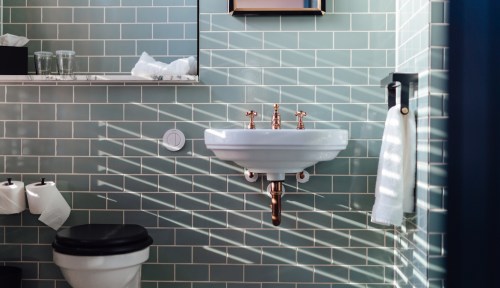Our editors independently select these products. Making a purchase through our links may earn Well+Good a commission
Sometimes nature calls at unexpected times. (Yes, we’re talking about the urge to poop.) Maybe you’re standing in the self-help aisle of your local bookstore or in the middle of a busy subway platform when the “I need to go now” feeling hits. But sometimes even when the feeling is very much there one second, the urge to poop disappears the next. Vanished.
Experts in This Article
pelvic floor therapist at the New Jersey-based Renew Physical Therapy
Some people might simply finish their game of Wordle on the porcelain throne before returning to work. But if you raced four blocks to the closest coffee shop bathroom hoping for sweet relief only to be met with… nothing, you might be wondering, What gives?
What causes the urge to go poop?
Well, in short, it’s totally normal for the urge to poop to come and go from time to time. The medical name for this is gastrocolic reflex, says Chelsea Waldkirch, PT, DPT, a pelvic floor physical therapist based in Arkansas, and it involves the way your body is triggered to facilitate the process of pooping.
“Contractions of the colon move stool through the colon into the rectum and pushes on the internal and external anal sphincter,” says Julia Connolly, PT, DPT at Femina Physical Therapy. As the stool moves down, the nerve cells sense the stretch in your rectum walls, which triggers the internal anal sphincter—a muscle that opens to allow stool to pass through—to involuntarily relax. “And you feel the urge [to poop],” says Dr. Connolly.
Why does the urge to poop sometimes disappear?
Now, here’s why the urge can suddenly go away. Hint: It involves holding it in while you desperately race to the bathroom. So, we know that the internal sphincter muscle involuntarily relaxes as stool moves through. But, Dr. Connolly explains that the external sphincter is under voluntary control, so if you squeeze and contract this muscle, it can cause the stool to move upward out of the anal canal. Then, like magic, the urge to poop disappears.
“This is just like how after a bowel movement, the internal anal sphincter closes again, and you no longer feel the urge to go. The urge comes back when the next colon contraction pushes stool into the rectum, and the cycle continues,” says Dr. Connolly.
Is it bad to hold your poop in for too long?
We all have to hold it in once in a while, but it’s best not to make this a habit. That’s because nerve cells down there can desensitize, muting the sensation of having to go poop. In turn, the longer the stool stays in the rectum, the more water is reabsorbed and the harder the stool becomes, leading to constipation.
Healthy poop schedules are all about consistency, says Dr. Waldkirch. The bowel likes being in a rhythm, so it’s a good idea to maintain healthy habits, like eating at the same time every day, getting a good night’s sleep, getting a good amount of fiber in your diet, staying hydrated, and not holding it when you have to go. (Not to mention getting into the optimal position to poo.) Doing these things as much as possible can help you get into a good bathroom routine—so you’re not caught off guard the next time the urge strikes.
Sign Up for Our Daily Newsletter
Get all the latest in wellness, trends, food, fitness, beauty, and more delivered right to your inbox.
Got it, you've been added to our email list.











